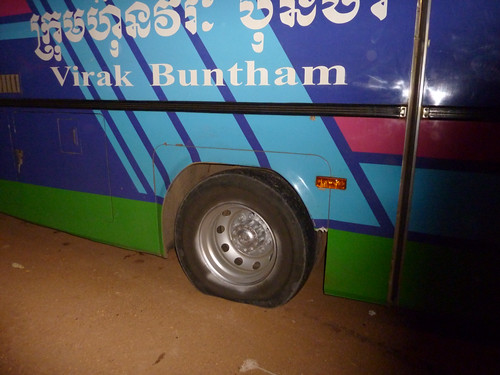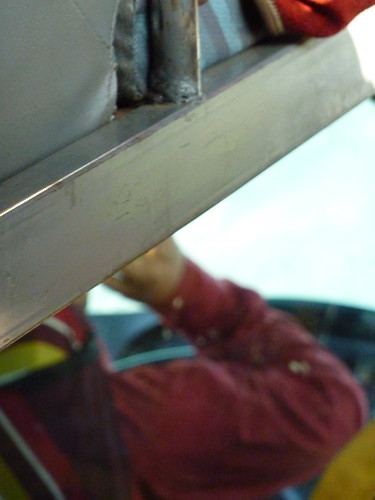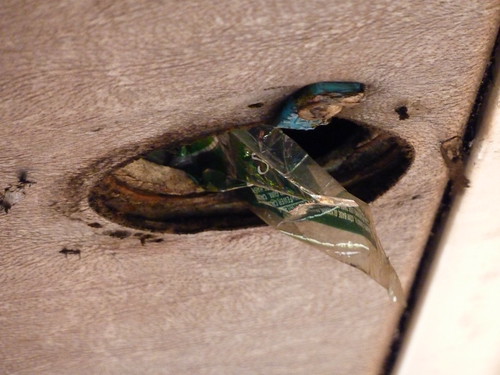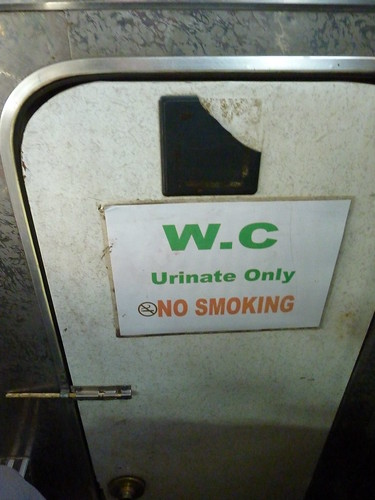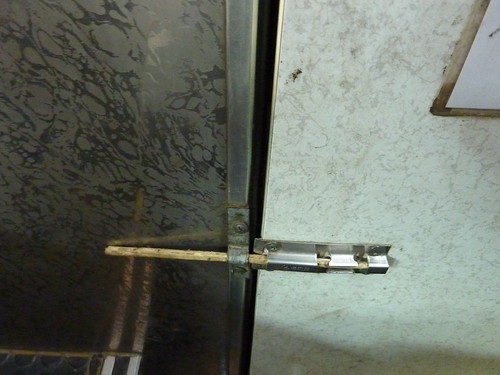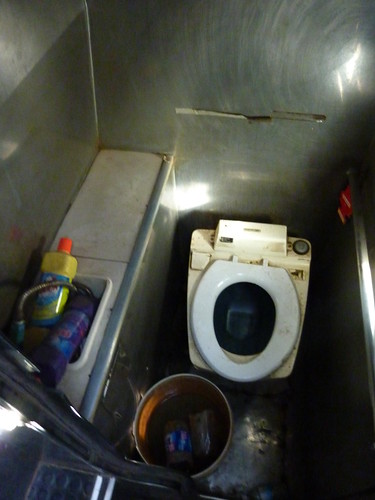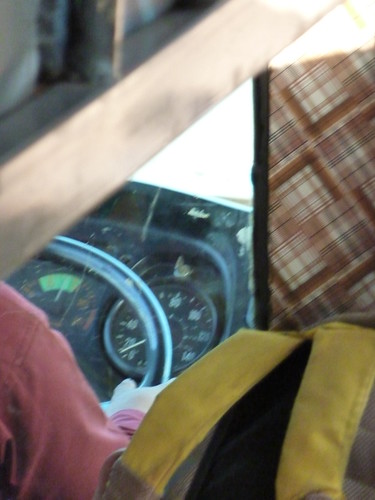They were fabulous hosts, pointing things out to me (e.g. a tiny islet with no people but a temple) and telling me about the projects on Koh Rong Samloem and Koh Rong. The Koh Rong satellite project, based in a small fishing village, was quite new, so they were still doing discovery diving: working out what was under the water around the island; mapping; surveying the seabed and marine life; and making up names for the reefs. Pretty exciting stuff, (although I suspect that the Cambodian government may not leap to adopt "pothead reef" as the official name if it becomes part of a marine protected area!).
It was great to arrive on a weekend and have a couple of non-working days to get to know some of the volunteers (the rest had gone back to the mainland for an internet fix or visa admin). Once we'd got over delicious-lunch torpor, they took us newbies over to "Bad Dog Beach" a breathtaking place that only reveals itself as you arrive panting (in using that word I speak only for my unexercised self) over a hill from the village. It's more beautiful than any picture can portray.
After the beach Hugo shared some tips on polite behaviour in the village, best observed because the project still needed to gain the trust and respect of villagers. There were a couple of anecdotes about people being invited to houses of the influential to drink and to eat interesting foods (impolite to refuse) but I was assured that it rarely happened to female volunteers. Well, my friends you may know what's coming next.
After a large dinner, I moseyed out onto the equivalent of our porch to finish my beer. As an aside, I should explain that the MCC bungalow, like others in the village, is a wooden house on stilts over the sea (this particular patch of sea otherwise known as "the poopy water" due to it also being where most things in the village are disposed of). The front side of the "porch" is right on the pier and the pier is the main road of the village. Anyway so, a gasper in one hand and half a beer in the other, I was taking in the night air, which still had the faint smell of fuel fumes from departing fishing boats. A man approached. "You like beer? You, me, drink beer". Shiiiiit. Not wanting to scupper the project single-handedly on my first night, I was led by the wrist along an single plank path - unlit, save for gentle flashes of diffuse lightening- over the poopy water to a beautiful porch with green plants and a large table of men and one elderly lady ("Mama"). A beer was pressed into my hands by the man - who'd now introduced himself as Lucky Blue. "Drink drink". A whole crab was put on a plate in front of me - "Nyam! Eat!" (with gestures in case I wasn't sure). I've never chosen to eat a crab, and I was clueless about how to crack the thing open. I gave it a few feeble twists until one of the other men took pity on me and did it for me. I started to pick at some spongy bits until Mama showed me which bits to eat. My relief at finishing this creature was shortlived, as another was put on my plate. Then a kind of langoustine and then squid. Each rest between mouthfuls was punctuated with "Nyam! Eat!" and rounds of laughter. Then Lucky Blue pulled out a bag of brown, dry shrivelled things and my heart sank (might they be monkey gonads - a test?)
But of course they weren't. They were sugared cashew nuts picked, dried and roasted by Mama, and she gestured to me "take the rest of the packet home". I was the evening's entertainment for sure, but there was much good-natured name and language swapping and I will never forget the Khmer words for "cheers, eat, crab, langoustine, squid". I don't know how they're spelt, but if you want to know: "chalamoy, nyam, kdam, pkang, muk".
 Well the time on the island flew by. I did quite a few dives in my first week, and was amazed at the difference in visibility between Koh Rong (1-3metres) which is not yet a protected area and is trawled with impunity and Koh Rong Samloem (10m+ visibility) which is a marine protected area with fishing restrictions in place, offering decent - and profitable - recreational diving. One can only hope that fisherman can be persuaded that there is a way to protect marine areas and enhance - rather than ruin - their livelihoods. It's a difficult argument for any government to have. Sadly, it may not even get to that point. There are plans for significant development on the island, which I understand include an airport, golf resorts and the like. It doesn't sound like sustainable development, local empowerment, or eco-resorts are terms which feature heavily in these plans.
Well the time on the island flew by. I did quite a few dives in my first week, and was amazed at the difference in visibility between Koh Rong (1-3metres) which is not yet a protected area and is trawled with impunity and Koh Rong Samloem (10m+ visibility) which is a marine protected area with fishing restrictions in place, offering decent - and profitable - recreational diving. One can only hope that fisherman can be persuaded that there is a way to protect marine areas and enhance - rather than ruin - their livelihoods. It's a difficult argument for any government to have. Sadly, it may not even get to that point. There are plans for significant development on the island, which I understand include an airport, golf resorts and the like. It doesn't sound like sustainable development, local empowerment, or eco-resorts are terms which feature heavily in these plans.  Unfortunately my ears bailed on me at the end of my first week (I suspect the ear infection was not entirely unrelated to the proximity of pothead reef to the poopy water, as I was not the only one with ear troubles). So, I was unable to do survey work after that (very disappointed) but I continued with teaching English with another volunteer. We gave informal, early morning lessons to the project leader's wife and our MCC cook, and in the afternoons we took English lessons at the local school. The kids were on holidays, but when they heard we were giving lessons, they rounded up all their mates to come along. Refeshingly keen lovely kids! The Khmer schoolteacher who usually teaches English (unpaid for that part of his job, I believe) showed us some of the teaching games he plays and took the first few lessons with us, but then was happy for us to take them on. Brilliant fun!
Unfortunately my ears bailed on me at the end of my first week (I suspect the ear infection was not entirely unrelated to the proximity of pothead reef to the poopy water, as I was not the only one with ear troubles). So, I was unable to do survey work after that (very disappointed) but I continued with teaching English with another volunteer. We gave informal, early morning lessons to the project leader's wife and our MCC cook, and in the afternoons we took English lessons at the local school. The kids were on holidays, but when they heard we were giving lessons, they rounded up all their mates to come along. Refeshingly keen lovely kids! The Khmer schoolteacher who usually teaches English (unpaid for that part of his job, I believe) showed us some of the teaching games he plays and took the first few lessons with us, but then was happy for us to take them on. Brilliant fun! In between teaching, the other thing to be done on the island was trash collection and incineration. Very hot and dirty work. Everyone's favourite, which would partly account for most volunteers' desire to dive 2-3 times a day. "Trash" involved getting a fire started in the volunteer-built incinerator in the morning (all those Nyanga water-boiler lessons finally yielded results, Dad) and then doing a beach clean up or collecting bins from the village every hour or so, then sorting, and burning their contents. Before the project started, there were no bins in the village and everything got disposed of in the same way that generations had disposed of (largely organic) waste: thrown on the ground or into the sea. But disposal of plastic etc in this way doesn't work. The MCC project is currently working on the basis that leading by example works better than preaching on arrival. So bins have been placed at various points throughout the village, and the volunteers collect these regularly. Long term, MCC hopes to build a larger incinerator and to have funding to employ a couple of villagers to collect and burn. The bins are being used, which is great.
In between teaching, the other thing to be done on the island was trash collection and incineration. Very hot and dirty work. Everyone's favourite, which would partly account for most volunteers' desire to dive 2-3 times a day. "Trash" involved getting a fire started in the volunteer-built incinerator in the morning (all those Nyanga water-boiler lessons finally yielded results, Dad) and then doing a beach clean up or collecting bins from the village every hour or so, then sorting, and burning their contents. Before the project started, there were no bins in the village and everything got disposed of in the same way that generations had disposed of (largely organic) waste: thrown on the ground or into the sea. But disposal of plastic etc in this way doesn't work. The MCC project is currently working on the basis that leading by example works better than preaching on arrival. So bins have been placed at various points throughout the village, and the volunteers collect these regularly. Long term, MCC hopes to build a larger incinerator and to have funding to employ a couple of villagers to collect and burn. The bins are being used, which is great.  Beach clean ups involved collecting rubbish washed up onto the beaches: the aptly named "Garbage Bay" and, on one occasion, as a treat, Bad Dog Beach. Beautiful beaches, marred by discarded fishing nets, old shoes, Red Bull bottles, lightbulbs, batteries, and infinite plastic straws and bits of polystyrene. Bad Dog beach, the stunning palm-fringed one in the pic above is also fringed by a high-tide line littered with medical waste. I'm talking used syringes, and the accompanying glass vials (syringe bottles) used in hospitals. The swim that we rewarded ourselves with after that beach clean up started with fairly careful foot placement in the shallows! Here's hoping the island-developers will fund proper medical/waste disposal units on the mainland/Vietnam or wherever that stuff is coming from, before they build the super-deluxe resorts.
Beach clean ups involved collecting rubbish washed up onto the beaches: the aptly named "Garbage Bay" and, on one occasion, as a treat, Bad Dog Beach. Beautiful beaches, marred by discarded fishing nets, old shoes, Red Bull bottles, lightbulbs, batteries, and infinite plastic straws and bits of polystyrene. Bad Dog beach, the stunning palm-fringed one in the pic above is also fringed by a high-tide line littered with medical waste. I'm talking used syringes, and the accompanying glass vials (syringe bottles) used in hospitals. The swim that we rewarded ourselves with after that beach clean up started with fairly careful foot placement in the shallows! Here's hoping the island-developers will fund proper medical/waste disposal units on the mainland/Vietnam or wherever that stuff is coming from, before they build the super-deluxe resorts. While I was on the island, we all had the privilege of being invited to a local wedding. A visual feast of colourful outfits (changed by both bride and groom several times), loads of delectable food (including banana blossom salad and a delicious duck), beer served with ice (and topped up throughout the evening with anything from ice to icebergs - take note anyone planning a wedding: saves alcohol and much drunkenness and is surprisingly refreshing), and many a Khmer dance lesson on the dance floor.
While I was on the island, we all had the privilege of being invited to a local wedding. A visual feast of colourful outfits (changed by both bride and groom several times), loads of delectable food (including banana blossom salad and a delicious duck), beer served with ice (and topped up throughout the evening with anything from ice to icebergs - take note anyone planning a wedding: saves alcohol and much drunkenness and is surprisingly refreshing), and many a Khmer dance lesson on the dance floor. So, its a long post this one, but I wanted to share with you my time in this lovely spot, with some of the kindest, most generous, and friendly people I have met on my travels. To say it was a special experience doesn't really do it credit, but I'll leave it at that. I do hope that you will forgive me for peppering my conversations with references to the Island over many months to come.
Pictures below
The village; snapshots of MCC (including industrial kitchen activity, weekend acitvities, and of the village kids who loved the fish ID book); incinerator; and the apocalyptic sunset.
Posted: 20 April 2012











